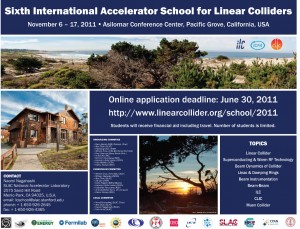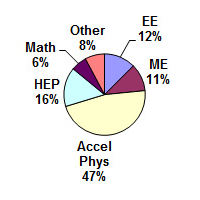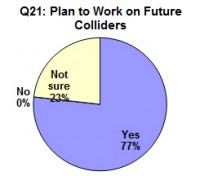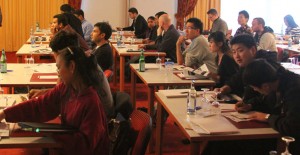I am pleased to announce the Sixth International Accelerator School for Linear Colliders that will be held from 6 to 17 November 2011. The Global Design Effort has both been a sponsor and contributed lecturers to the first five schools in this series. The last school was held in Villars-sur-Ollon, Switzerland last autumn. This year’s school will again focus on subjects in accelerator physics related to teraelectronvolt-scale lepton colliders, including the ILC, Compact Linear Collider (CLIC) study and the muon collider. We encourage young physicists to apply. In particular we welcome those physicists who are considering changing to a career in accelerator physics.
Very few universities have a PhD programme in accelerator physics. As a result, most accelerator physicists become interested in the field following their academic studies. High-energy physics laboratories around the world provide opportunities for scientists and engineers to become involved in accelerator physics and technology projects. In addition, accelerator schools provide more academic learning opportunities for students interested in becoming involved more deeply in this area. The ongoing work towards a next-generation lepton collider involves many of the leading accelerator physicists in the world and involves many challenging and forward-looking accelerator issues and technologies.
The Linear Collider Accelerator School is responsive to the worldwide needs of the high-energy physics community to develop the next generation of accelerator physicists for future high-energy physics projects, as well as to produce experts for work on the broader accelerator applications in research, medicine and industrial applications. For our school, we accept graduate students, postdoctoral fellows and junior researchers from around the world, and we welcome applicants who are considering making a career change to accelerator physics.
The curriculum for the school takes an in-depth approach, enabling students who took part in a previous school to apply more specialised learning. The school will consist of a series of lectures by different experts covering the most interesting and challenging high-energy linear collider accelerator science topics. Each lecturer will assign homework problems and take part in the evening problem session associated with those problems.
The main themes of this year’s school will be the following:
- Overview of teraelectronvolt (TeV)-scale future lepton colliders (ILC, CLIC and the muon collider)
- Accelerator physics for sources, damping rings, linacs and beam delivery systems
- Superconducting and warm radiofrequency (RF) technology, low-level RF and high-power RF, and beam instrumentation
There will be an eleven-day programme, including an excursion, a site visit and an examination. The first two days will be an introductory course with an overview of proposed future lepton colliders (ILC, CLIC and the muon collider). This will be followed by two elective courses, one on accelerator physics and the other on RF technology. Both of these will run in parallel for 6 days. Each student is required to take the introductory course and one of the electives. There will be homework assignments and a final examination that will help measure student progress, but no university credits.
I have lectured at the linear collider school the past few years and have found the quality of the student and the interactive learning environment to be very stimulating. I am happy to be able to participate once again at this year’s school, giving the opening introduction where I will motivate TeV-scale lepton colliders, as well as give the performance requirements that will enable reaching the physics goals. I will also give the introductory lecture on the International Linear Collider, giving an overview of the various systems and challenges. The other lecturers will consist of many of the leaders in the fields making up the course curriculum. This will provide a unique opportunity to learn directly from the accelerator scientists in the field. We have had many applicants from all over the world for the past schools, assuring a set of about 70 (our maximum) very good students.
I enthusiastically encourage all those interested to visit the LC school website and to apply for this year’s school.






Recent Comments